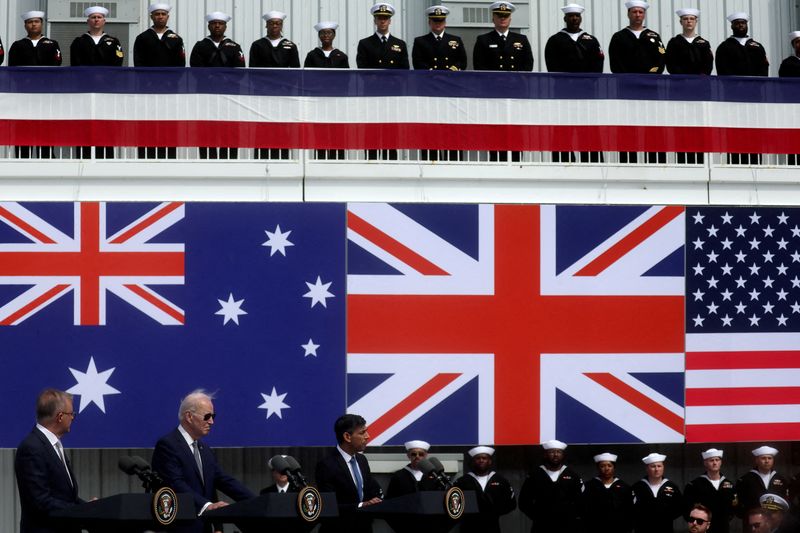By David Brunnstrom
WASHINGTON (Reuters) – The U.S. State Department said on Friday it expects to finalize new trade exemptions for the AUKUS defense project with Australia and Britain in the next 120 days, signaling a further delay in the initiative but offering the prospect of a positive result in the project to combat China.
AUKUS was formed in 2021 to address shared concerns about China’s growing power and would involve Australia in the acquisition of nuclear-powered attack submarines, among other elements of defense cooperation. But sharing closely guarded technology is governed by strict US International Traffic in Arms Regulations (ITAR).
The National Defense Authorization Act (NDAA) of 2024 requires President Joe Biden to determine within 120 days of signing it into law on December 22 whether Australia and Britain have export control regimes “comparable to those of the United States” and therefore can benefit from exemptions to the ITAR Regulation. On Saturday we reach 120 days.
“Exemptions in our export control systems, under a framework of standards shared with Australia and the United Kingdom, are critical to harnessing and maximizing the innovative power that resides in our defense industrial base,” the State Department said.
“We expect to finalize the new trade exemptions – based on stakeholder input – over the next 120 days,” he said.
Although the State Department statement indicates a delay in Biden’s positive decision, the legislation requires him to review the matter within another 120 days.
A statement from the UK government said it “warmly welcomes the significant progress” made to advance AUKUS.
“The UK and Australia are on track to meet the requirements of the NDAA and benefit from the exemptions,” he said. “We are confident that within the next 120 day period we will have completed all requirements for full implementation of the ITAR exemptions.”
Australia’s Department of Defense said in a statement that it welcomed the US’s “tangible steps” to simplify export control licensing requirements for AUKUS.
“The U.S. Department of Commerce’s decision to establish a license-free dual-use export environment among AUKUS partners is another significant step toward creating a seamless environment for innovation, cooperation and collaboration “, he has declared.
This week some US Republican lawmakers expressed concern about delays in the AUKUS if Biden did not grant the exemptions.
In remarks shared with Reuters, Michael McCaul, Republican chairman of the House Foreign Affairs Committee, said the exemptions were needed to allow companies to quickly develop advanced capabilities without “burdensome bureaucracy and regulations.”
Jeff Bialos, a former senior Defense Department official now a partner at law firm Eversheds Sutherland, said the State Department has opposed blanket exemptions for Britain and Australia since they were first proposed by the Pentagon nearly 25 years ago, while he was in office.
He called the State Department statement “forward-leaning” and said he now expects the three countries to submit draft exemptions covering each other’s export control rules.
“One of the criteria is that other countries also have a system that allows exports to the United States to be exempt. It’s reciprocal,” he said.
On Thursday, the US Commerce Department said it was scaling back export control requirements for Australia and Britain to promote cooperation under the AUKUS.
However, Commerce only handles licensing of certain defense-related items, not the broader range of items covered by the ITAR regime, which is governed by the State Department’s Bureau of Political-Military Affairs.

The first pillar of AUKUS concerns the supply of nuclear-powered submarines to Australia, while the second pillar calls for more immediate cooperation in high-tech defense items such as quantum computing, undersea capabilities, hypersonics, intelligence artificial and computer technology.
In announcing its move, the Commerce Department said both Australia and Britain “have robust export control systems in place and have taken additional steps in recent months to improve protection of the technology.”